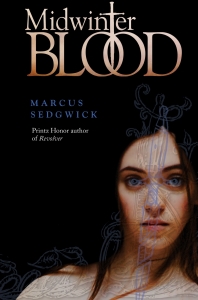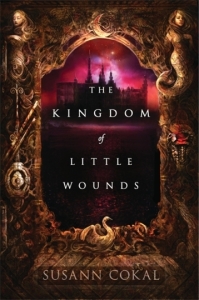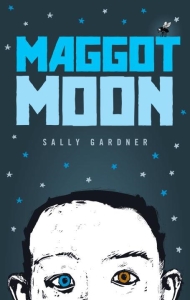Reviews of the 2014 Printz winners
Winner: Midwinterblood by Marcus Sedgwick
(Roaring Brook)
Sedgwick takes us backwards, first by sixty-year intervals and then by leaps of centuries, in seven short stories centering on a remote northern island and the potent, drug-laden flower that blooms there.
 Winner:
Winner: (Roaring Brook)
Sedgwick takes us backwards, first by sixty-year intervals and then by leaps of centuries, in seven short stories centering on a remote northern island and the potent, drug-laden flower that blooms there. Each story begins with love and ends with death, whether of young lovers, parents and children, or brothers and sisters. It’s only in reading through all seven that we begin to understand the prehistoric ritual that brings bloody death and forbidden love to “Blessed Island.” In each of these stories — set in 2073, 2011, 1944, 1902, 1848, the Viking period of the tenth century, and “time unknown” — Sedgwick’s prose is taut, careful, and chilling, as it moves through the bright, gentle language of love and the island’s beauty to the abrupt, deliberate sacrifice that ends each section. The dark deceptiveness of words themselves underlies the island’s shift from “bloody” to “blessed” (as the narrator says in a philological moment, tracing the word’s evolution from Old to Modern English). But it’s the earthy, the romantic, and the ghostly — rather than the cerebral — that make this book such a complete work of art. DEIRDRE F. BAKER
 Honor: The Kingdom of Little Wounds by Susann Cokal
Honor: The Kingdom of Little Wounds by Susann Cokal(Candlewick)
In this taut, wrought (not for the squeamish) story of court intrigue in a fictional 1570s Scandinavian city, three women brought together by bad events realize that men are at best self-interested "users of women." Diseases (especially STDs), poisons, and cruelty abound; Cokal is clearly fascinated by Renaissance medical remedies. Vivid writing and a coldly intelligent narrative voice suit the clever plot and fiercely drawn cast. DEIRDRE F. BAKER
 Honor:
Honor: (Candlewick)
Gardner (I, Coriander, rev. 8/05) here imagines an alternate, dystopic UK: a repressive 1950s regime that calls itself the Motherland, abhors “impurities,” is led by a man with a bad haircut, and consigns undesirables to the derelict housing of Zone Seven. That’s where fifteen-year-old Standish Treadwell and his Gramps survive, thanks to Gramps’s ingenuity at reusing and bartering. Out of this life of hard-won subsistence and oppressive schooling, Standish tells the story of his friendship with “supernova bright” Hector next door — Hector, who realizes that dyslexic Standish may not have a train-track mind, but has imagination “in bucketloads.” When Hector and his parents disappear, taken by the authorities, Standish sets out to rescue and avenge him, and uncovers a grotesque government hoax. Standish’s tale has the terse, energetic tension of poetry; his phrases and sentences roll out with irony, tenderness, horror, or love, but always vividly. “The place smelled of over-boiled cabbage, cigarettes, and corruption,” he notes of his school; or, “What he was doing there I hadn’t a snowflake of an idea.” Even the chronology of Standish’s story depends on a rearrangement of order, where present, past, and future stand side by side. Most appealing of all, however, is Standish Treadwell himself: tender, incisive, brave, and determined, he takes a stand and treads well. Frequent pencil illustrations that function almost as a flipbook underscore the story’s subtext of the unending cycle of violence and death. DEIRDRE F. BAKER
 Honor:
Honor: (St. Martin’s Griffin)
It’s the start of a new school year in 1986 Omaha when sophomores Eleanor and Park meet for the first time on the bus. They are an unusual pair: she’s the new girl in town, an ostracized, bullied “big girl” with bright red curly hair, freckles, and an odd wardrobe; he’s a skinny half-Korean townie who mostly wears black and tries to stay out of the spotlight. But as they sit together on the school bus every day, an intimacy gradually develops between them. At first they don’t talk; then she reads his comics with him; he makes her mixtapes of his favorite rock bands; they hold hands; and eventually they are looking for ways to spend every waking hour together. Their slowly evolving but intense relationship is chaste first love, authentic in its awkwardness — full of insecurities, miscommunications, and sexual awakenings — and life-changing for them both. When Eleanor’s unstable home life (replete with abusive stepfather) ultimately tears the young lovers apart, the novel ends realistically: uncertain, yet still hopeful. Rowell presents her teen protagonists’ intelligent observations, extreme inner desires, and irrational feelings through compelling alternating narrations. She imbues the novel with rich character development, a spot-on depiction of the 1980s, and powerful descriptive passages (“Holding Eleanor’s hand was like holding a butterfly. Or a heartbeat. Like holding something complete, and completely alive”). It’s an honest, heart-wrenching portrayal of imperfect but unforgettable love. CYNTHIA K. RITTER
 Honor: Navigating Early by Clare Vanderpool
Honor: Navigating Early by Clare Vanderpool(Delacorte)
Jack and Early are both outsiders in the Morton Hill Academy for Boys, their mid-1940s Maine prep school. Jack is new and from Kansas and has never before seen the ocean or rowed crew; Early is gifted but strange, dropping in and out of classes, subject to brief epileptic seizures, bedding down in an abandoned janitor’s workshop rather than in the dormitory. The two boys are each mourning someone, too: Jack’s mother has died, thus occasioning his Navy captain father to put him in boarding school; Early, we come to learn, is not only orphaned but has lost his beloved older brother (and Morton Hill golden boy) to the war in Europe. While the writing is as minutely observant as it was in the author’s Newbery-winning debut, Moon over Manifest, this book has a stronger trajectory, developed by the classic quest structure that emerges when Vanderpool sends the boys into the Maine wilderness, on a search that Jack thinks is metaphorical but is gradually revealed to be real — and life-changing — for both of them. Interspersed episodes from a story Early tells about a wanderer named Pi sit uneasily; and Jack’s narration can be too self-aware and self-explanatory, leaving the reader with perhaps not enough to do, but the same attentiveness also gives the book a rich texture and envelopment.
RELATED
RECOMMENDED
ALREADY A SUBSCRIBER? LOG IN
We are currently offering this content for free. Sign up now to activate your personal profile, where you can save articles for future viewing.







Add Comment :-
Be the first reader to comment.
Comment Policy: